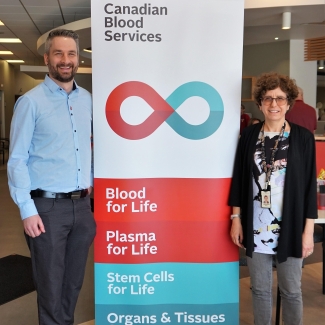New research suggests novel uses for a plasma-derived medication
Thursday, August 29, 2019 Catherine Lewis
A treatment now used to fight two diseases might have the potential to help patients with other conditions, too, according to new research funded by Canadian Blood Services.
The new publication, “Treating murine inflammatory diseases with an anti-erythrocyte antibody,” came out Aug. 21 in Science Translational Medicine, a high-impact scientific journal.
Canadian Blood Services supplies hospitals with anti-D, a medication made from human plasma, to treat the autoimmune disease immune thrombocytopenia (ITP) and to prevent hemolytic disease of the fetus and newborn. Plasma is the protein-rich liquid in blood that helps other blood components circulate throughout the body. Anti-D is a solution of antibodies against a protein on red blood cells, made from the plasma of donors. At this time, anti-D isn’t indicated for any other diseases.
In this new study, Dr. Alan Lazarus, a research scientist and immunologist at the Canadian Blood Services Centre for Innovation, discovered that a red blood cell antibody called Ter119 works in three mouse models of inflammatory arthritis, as well as one model of transfusion-related acute lung injury (TRALI). TRALI is very rare, but it’s one of the leading causes of transfusion-related deaths, and there is no good treatment for it. These findings suggest that anti-D may be a possible treatment for these diseases in humans.
“The knowledge that anti-D could be used to treat TRALI as well as autoimmune diseases other than ITP is good news for patients,” says Dr. Lazarus. “This may have broad therapeutic potential.”
If it’s demonstrated to work in humans, this approach may also provide an alternative to immune suppression, which is how doctors typically approach autoimmune disorders, but not a good option for everyone.
- To learn more about this study, read our latest Research Unit
This work is basic research using mouse models, and an essential step in improving medical understanding and opening doors to new possibilities for better patient care.

Dr. Alan Lazarus is a scientist at St. Michael’s Hospital’s Keenan Research Centre for Biomedical Science and a professor at the University of Toronto. This work received funding support from Canadian Blood Services, funded by the federal government (Health Canada) and the provincial and territorial ministries of health. The views expressed in the publication do not necessarily reflect the views of the federal government of Canada, or provincial or territorial governments. The work also received funding from Canadian Institutes of Health Research, CSL Limited, and CSL Behring, a biopharmaceutical company that produces human anti-D.
Canadian Blood Services – Driving world-class innovation
Through discovery, development and applied research, Canadian Blood Services drives world-class innovation in blood transfusion, cellular therapy and transplantation—bringing clarity and insight to an increasingly complex healthcare future. Our dedicated research team and extended network of partners engage in exploratory and applied research to create new knowledge, inform and enhance best practices, contribute to the development of new services and technologies, and build capacity through training and collaboration. Find out more about our research impact.
The opinions reflected in this post are those of the author and do not necessarily reflect the opinions of Canadian Blood Services nor do they reflect the views of Health Canada or any other funding agency.
Related blog posts
For this installment of “Meet the Researcher” we caught up with Dr. Alan Lazarus a research scientist and immunologist at Canadian Blood Services’ Centre for Innovation. How long have you been at Canadian Blood Services? I've been working with the blood service in Canada since 1994. What’s your role...
We just published our 50th Research Unit. Read on to discover how you can use this trove of information to learn more about the excellent work conducted at the Canadian Blood Services Centre for Innovation.
As work gets underway, the lead investigators in one of fifteen funded MSM Research projects, discuss the significance of consultation and collaboration to their research, and explain the anticipated impacts and feasibility of introducing alternative donor eligibility screening criteria for source plasma.


